The Panama Hat Lamp by Wim Rietveld for Gispen
(Please note that this article will be interrupted by a commercial break)
Wim Rietveld (1924-1985) studied Industrial Design at The Hague Academy. After graduation he succeeded his father—the world-famous architect and designer—Gerrit Th. Rietveld, in becoming a trailblazer in industrial design. He introduced furniture for simple interiors, in line with the ideas of the Dutch design movement Goed Wonen (in English: Good Living). In 1956, when he was head of the design department of the Dutch furniture and lighting manufacturer Gispen, he introduced the Panama Hat Lamp.
-
 Wim Rietveld
Wim Rietveld
During his period at Gispen, from 1953 to 1957, Wim Rietveld rejuvenated the collection. He delisted a large part of the old collection, had some models adapted to new production technology and, most importantly, he introduced some brand new designs.
-
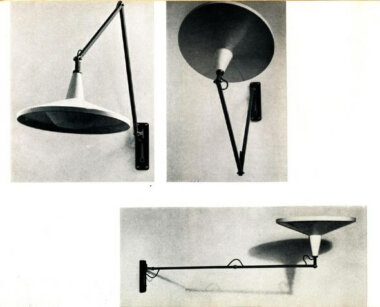 The Panama Hat Wall Lamp, Giso catalogue No. 37 (from the Palainco archive).
The Panama Hat Wall Lamp, Giso catalogue No. 37 (from the Palainco archive).
The effect of this rejuvenation becomes clear when comparing the Gispen catalogues from 1951 (No. 36) and 1957 (No. 37). In a clean break in style, it goes from quaintly ornate in the No. 36 catalogue, to the sleek, modern look of the Panama Hat Lamp.
-
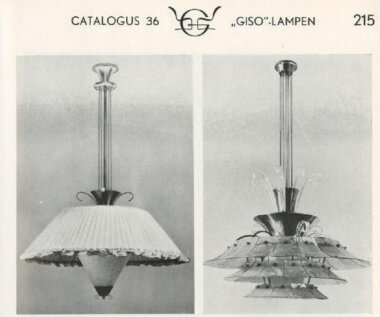 The old portfolio, catalogue no. 36 ...
The old portfolio, catalogue no. 36 ...
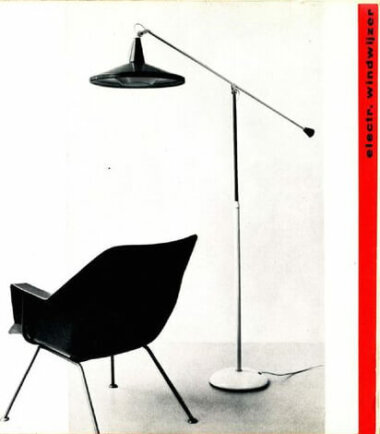 ...vs the rejuvenated product line
(both from the Palainco archive).
...vs the rejuvenated product line
(both from the Palainco archive).
-
In 1956 Rietveld designed the highly original Panama Hat Wall Lamp, No. 4050, introduced in the 1957 Giso catalogue. Later, the design department of the Gispen company designed a series of different models based on the original design.
-
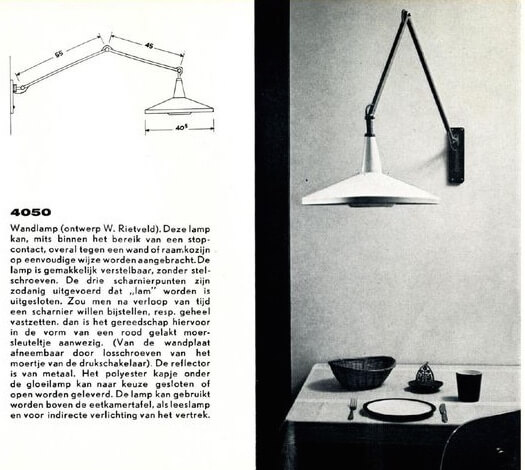 “The lamp can be used above the dining table..." (from the Palainco archive)
“The lamp can be used above the dining table..." (from the Palainco archive)
-
It’s funny to read how consumers were addressed 60 years ago: “This lamp can, provided it is within the range of a wall socket, be attached to a wall or window frame in a simple way.” Or what about this: “The lamp can be used above the dining table, as reading light and for indirect lighting of the room.”
The text also contains more technical information: “One might want to adjust a hinge over time, or fully tighten it; the tool for this purpose is present in the form of a red lacquer wrench.” And: “The polyester cover under the bulb can de delivered either closed or open.”
Partially due to the wrench and the cover, it has become rare to find a complete and original Panama Hat Lamp. The red wrench can easily become lost, and the polyester cover, or diffuser, was not resistant to the heat of the bulb.
This 1963 commercial, made for showing in a cinema theater, also contains the Panama Hat Wall Lamp. Around 1:41 minutes, you will briefly see model No. 4050.
-
-
The design department of the Gispen company developed three variants of Rietveld’s original Panama Hat Wall Lamp: a desk lamp (No. 5350, 1957), a pendant in two versions (No. 2350 and No. 2450) and a floor lamp (No. 6350, 1957).
-
 Model No. 6350 on a flyer (from the Palainco archive).
Model No. 6350 on a flyer (from the Palainco archive).
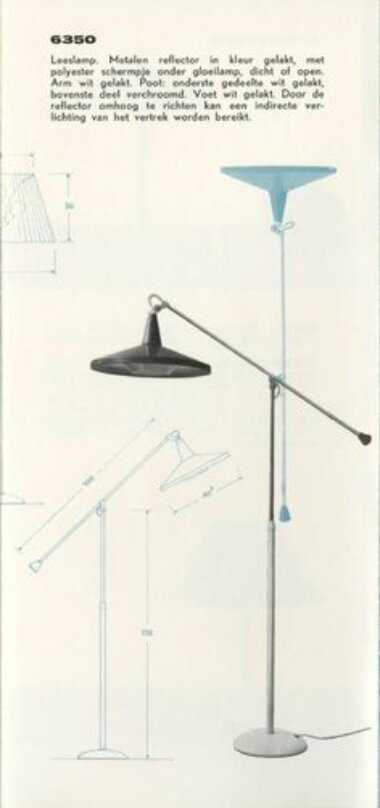 Model No. 6350 in Catalogue No. 37 (from the Palainco archive).
Model No. 6350 in Catalogue No. 37 (from the Palainco archive).
-
Have you seen the price of the lamp on the flyer? It used to be fl. 84,75, or recalculated to Euros € 38,46. Of course, that was more than sixty years ago, so it would be more in today’s money. But it was still reasonably priced, a designer lamp affordable for ordinary people. Nowadays, as vintage design items, they are worth a lot more!
The catalogue gives us some details on the material and the colours: “Arm lacquered white. Leg: bottom part painted white, upper part chromed. Foot lacquered white.”
The least well-known model in the Panama Hat series is the desk lamp (No. 5350, from 1957).
-
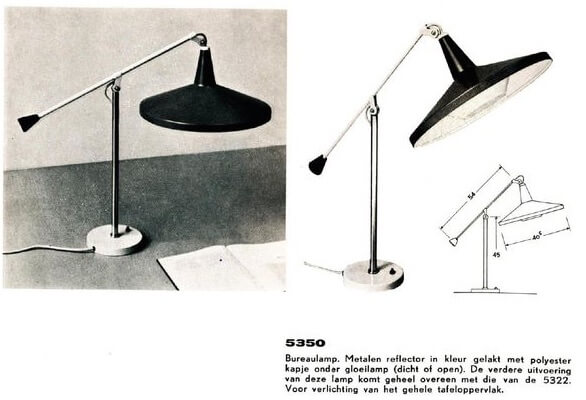 Model No. 5350, from Catalogue No. 37 (from the Palainco archive).
Model No. 5350, from Catalogue No. 37 (from the Palainco archive).
-
The pendant was available in 2 different versions, No. 2350 (1957) and No. 2450. They only differ in their suspension systems: whereas the length of the wire of No. 2350 is fixed, it is possible to change the height with the system used in No. 2450. Or as indicated in the catalogue: “The pulley system makes it possible to bring the lamp to the correct height above the table, and, if the table is removed, to slide the lamp upwards, so that one can walk under it.” Again, such useful consumer information…
-
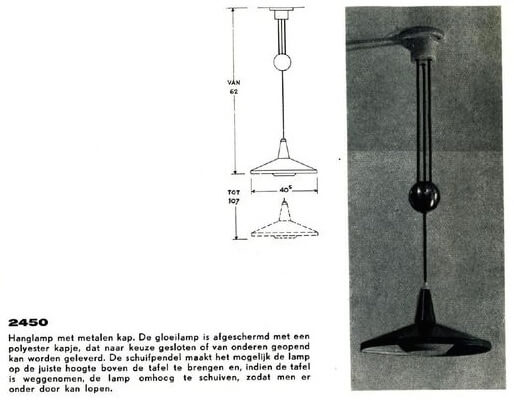 Model No. 2450, from Catalogue No. 37 (from the Palainco archive).
Model No. 2450, from Catalogue No. 37 (from the Palainco archive).
-
If you would like to be the first to read articles on designers and special designs, please subscribe to our newsletter.
-
- Literature: Gispen Giso Catalogue No. 36 & No. 37.
Unless otherwise stated, all material is sourced and/or generated internally. All rights reserved.
- Text: Palainco, Koos Logger & Ingrid Stadler.
- Image sources: Stichting Gispen Collectie, Gispen Giso Catalogue No. 36 & No. 37, Joop Geesink & the Palainco Archive
The article and its contents may not be copied or reproduced in any part or form without the prior written permission of the copyright holders.
Published on: 10 November 2016